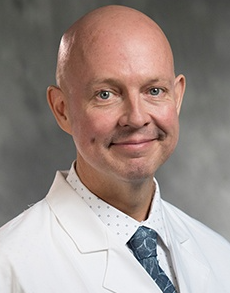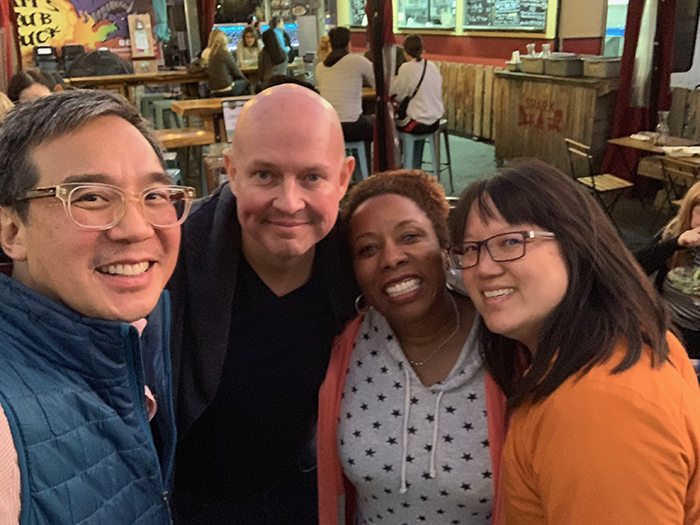
This week's Faculty Spotlight shines on Trevor Burt, MD, associate professor of pediatrics in the Division of Neonatology. Burt talks to us about how he gravitated toward pediatrics early in med school – but was drawn to neonatology during his junior year of residency where he got to attend and participate in high-risk deliveries. He also talks about his research interests in human developmental immunology. Specifically, his lab studies human T cell development and function, with a particular interest in immune tolerance. Notably, Burt has been particularly inspired by the creativity and resilience of his colleagues during the pandemic. As an example, he points to the challenges of rounding remotely on complex patients with multidisciplinary teams, and how teams have been flexible and creative in finding the best way to accomplish that.
How long have you been at Duke? How did you decide to come here?
I moved here in September 2019 from San Francisco, where I’d lived for the past 14 years. I started at UCSF as a neonatology fellow, and stayed on the attending faculty there while building and directing an immunology research lab. I was drawn to Duke and Durham for several reasons, but one of the most exciting factors was the chance to be a part of the Children’s Health and Discovery Initiative (CHDI).
What were your pre-COVID responsibilities at Duke? What did a typical day for look like?
I split my time between attending in the NICU and basic/translational research. On the clinical side, I get to participate in the care of our complex patients while working closely with the multidisciplinary team that makes the NICU tick. While I am still in the process of establishing my lab here at Duke, my favorite kind of day in the lab is one where I get to sit with trainees to plan experiments, brainstorm ideas, and interpret data. That process of watching a story unfold from the data is really exciting.
How has the COVID-19 pandemic affected your work? What’s one strategy you and your colleagues have used to adapt or compensate?
The NICU was already a very busy place even before the pandemic, and that certainly hasn’t changed. I think we’ve all had to be creative about how to still provide excellent clinical care, while consciously maintaining a culture of care and support for patients, for their families, and for each other. I’ve been really inspired by the creativity and resilience of my colleagues during this period. As an example, I’d point to the challenges of rounding remotely on complex patients with multidisciplinary teams, and how teams have been flexible and creative in finding the best way to accomplish that.
How and when did you initially become interested in pediatrics and neonatal perinatal medicine in particular?
I gravitated toward pediatrics early in med school – but neonatology came as a bit of a surprise to me. I think I had my A-HA moments during my junior year of residency while rotating at Brigham and Women’s Hospital, where we got to attend and participate in all of the high-risk deliveries, which I found really exciting. In that rotation we worked directly with an attending to care for our own small team of convalescing babies, mostly with complex histories. Getting to know those families and watch those babies go home was really satisfying. I love that neonatology represents an intersection of intensive care and complex physiology with compelling patient/family interactions and social dynamics. As a researcher, neonatal-perinatal medicine also has so many unanswered questions that are wide open for discovery.
Is there any research you are doing or plan on doing?
My research interests are in human developmental immunology. Specifically, my lab studies human T cell development and function, with a particular interest in immune tolerance. During fetal development, T cells help to facilitate tolerance toward self and maternal antigens. By the time of birth and during childhood, the immune system must adapt to deal with commensal organisms and fight pathogens. Many diseases of pregnancy, especially preterm labor, have a strong component of ‘broken tolerance’ leading to pathological inflammation. I am especially interested in the molecular and cellular mechanisms underlying these aspects of immune system development and function. We take a general approach of using contemporary molecular biology techniques (e.g., ATAC-seq, single cell RNA-seq, CRISPR-cas9 editing) to study primary human cells from both normal healthy subjects and patients affected by inflammatory disease (e.g., preterm labor and necrotizing enterocolitis).
What do you enjoy most about your work?
One of the exciting things about studying human immunology during the newborn and early childhood period is that so little is known about molecular and cellular mechanisms of immune-mediated disease in that window. That means that every unknown is a chance for potentially meaningful discovery – but also makes it a challenging area to study. There are very real hurdles of limited sample volume availability and challenges associated with subject recruitment and retention. Recently, there has been a huge push to study human disease (including infectious disease) using human samples, and Duke is at the forefront of that effort with its substantial investment in the CHDI and similar research programs.
How has the epidemic affected your life outside of Duke? What’s one positive strategy or resource you’ve found that helps you cope?
It’s been an interesting time to be new in town. Some of my plans to explore restaurants, music, museums, etc. have been put on a delayed timer. On the other hand, part of my daily mental health routine is to get outside for a walk. I’ve been picking different neighborhoods in Durham and walking to and through them. So, it’s actually been a really good chance to get to know my new home better.
What passions or hobbies do you have outside of Duke?
Music has always been a big part of my life. I play piano, and for the last couple of years I sang in the San Francisco Bach Choir. I’m a big fan of live music, contemporary dance, and musical theater, and thankfully I did get to experience some of the local arts scene scene prior to the pandemic. I really love cooking, and I can get very nerdy about chefs and cookbooks.
